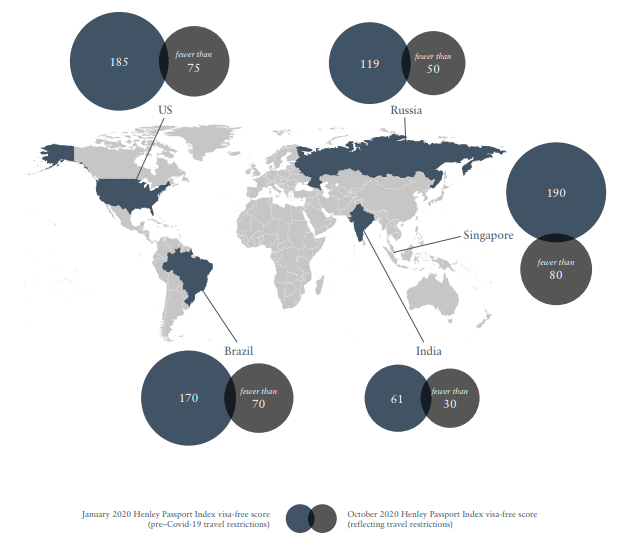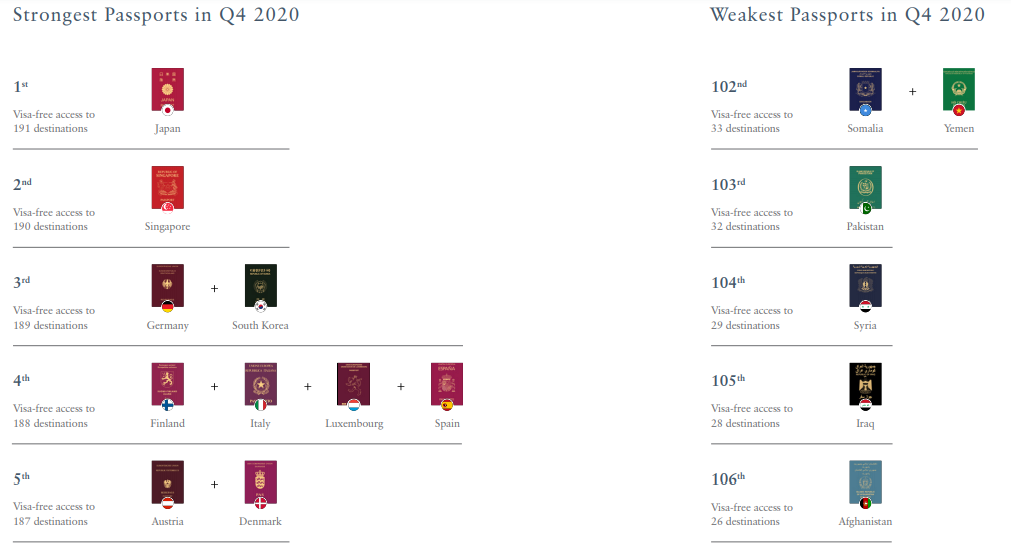Dr Christian H Kaelin, chairman of Henley & Partners and inventor of the passport index concept, one of a number of measures now available to reference passport power, says travel freedom is something citizens of wealthy democratic countries such the UK, the US, and Western European nations have taken for granted for decades.
"The pandemic has abruptly changed this," he says, and "there's been a shift away from travel freedom being regarded as the prerogative of nationals with once-powerful passports, towards a realisation that it is now a necessary luxury for those wishing to access first-class education, business opportunities, and quality healthcare for themselves and their families".
At the beginning of the year, for instance, the US passport was ranked in 6th position on the Henley Passport Index, based on the number of destinations their holders can access without a prior visa. At that time Americans could travel hassle-free to 185 destinations around the world. Since then, that number has dropped dramatically by over 100, with US passport holders currently able to access fewer than 75 destinations, with the most popular tourist and business centres notably excluded.
Other significant changes in the once-solid global mobility hierarchy "paint an equally vivid picture of the chaos caused by the Covid-19 pandemic," notes the Index's authors. At the beginning of 2020, the Singapore passport was ranked second globally, with passport holders able to access an unprecedented 190 destinations globally. However, under the current travel restrictions, Singaporeans can travel to fewer than 80 destinations around the world.
It is a similar story for Brazilian passport holders who were able to access 170 destinations, but currently approximately only 70 are accessible. The decline in mobility and passport power for countries such as India and Russia have been less dramatic, but nevertheless indicative of an overall shift. Russian citizens had access to 119 destinations prior to the Covid-19 outbreak but can currently travel to fewer than 50. At the beginning of the year, Indian passport holders could travel to 61 destinations without a visa, but due to virus-related restrictions they currently have access to fewer than 30.

The events of 2020 are unprecedented and some form of normality will return. Dr Parag Khanna, founder of FutureMap, says that increasingly restrictive migration policies have also encouraged many people to seek out a Plan B. "Even prior to the pandemic, Brexit had pushed British professionals to seek German, French, Spanish, and other EU nationalities based on lineage, or to pursue residency leading to citizenship in countries such as Portugal," he explains.
"Americans have availed themselves of similar options in countries ranging from Canada to Malta. Recent estimates suggest that interest in investment migration programs has jumped five-fold from 2019 through mid-2020," he adds.
Dr Juerg Steffen, CEO of Henley & Partners, concurs and says there is no question that the volatility of 2020 has boosted the appeal. "We've seen unprecedented interest from citizens of developed economies, particularly Americans with a startling 238% increase in enquiries from between January and October compared to the same period in 2019. Alternative residence or citizenship is increasingly seen as an indispensable asset and a vital hedge against ongoing volatility."
But, when we take the various pandemic-related travel bans and restrictions into account we quickly return to normality.

In the 4Q 2020 update, Japan continues to hold the number one spot on the Henley Passport Index, with a visa-free/visa-on-arrival score of 191. Singapore remains in second place, with a score of 190, while Germany and South Korea are tied third, each with a score of 189. European Union member states continue to perform best overall, with countries from the bloc taking up most of the spots in the index's top ten.
At the other end of the global mobility spectrum, the Afghan passport remains the world's weakest, in 106th place, with a visa-free or visa-on-arrival score of just 26. Only just above it are Iraq, Syria, Pakistan, Somalia and Yemen.
The biggest climbers over the last decade (2010 to 2020) have been the United Arab Emirates (+47 from 18 to 65 destinations), Taiwan (+37 from 32 to 69 destinations), Colombia (+31 from 42 to 73 destinations), Timor-Leste (+31 from 54 to 85 destinations) and Albania (+28 from 50 to 78 destinations). Meanwhile, Nigeria has seen the largest slip ahead of Syria, Libya, Yemen, Sierra Leone, Sri Lanka and Bangladesh.